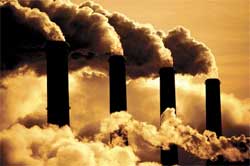Sacci warns carbon tax must not hurt economy

SA is due to implement a carbon tax from 2015, at a rate of R120 a ton of carbon dioxide, or its equivalent, for heavy emitters.
Sacci policy consultant Pietman Roos said that the best-case scenario would be a rethink on the introduction of a carbon tax but that a "significantly reduced" tax rate would be preferable to the worst-case scenario where none of the submissions, concerns and criticism levelled against the proposed tax were taken into account.
Roos said at the inaugural indirect tax summit of the South African Institute of Tax Practitioners in Johannesburg that Sacci would support a carbon tax in principle if it was revenue-neutral.
The discussion took place as new Australian Prime Minister Tony Abbott announced that the tax would be abolished on coal and iron ore, but retained on petroleum.
Roos said that if the South African government was to recover, for example, R100 from the economy through carbon taxes, then it must spend a similar amount on improving efficiency in industry so SA can create a green economy.
Revenue recycling
He said there was a reference to revenue recycling in the Treasury's policy document, but there was no clarity on how this would be implemented. Sacci had raised this issue with the Treasury, which said it was not possible to say how the revenue would be recycled back into the economy.
Roos also said one of the caveats that was not addressed was the impact on employment. He warned that job losses would be difficult to prevent if the labour market was not flexible when industries cut back on production and shed jobs in order to reduce their carbon emissions.
"Addressing anything about SA's labour market was difficult at this stage," he said.
He was challenged by a member of the audience who said the Treasury would not levy a tax that would harm the economy.
Roos replied that no government was "all-knowing" and robust debate must be allowed when the state took decisions that could have harmful consequences.
The draft carbon tax bill, giving industry more clarity on what to expect in terms of revenue recycling, was expected to be published next year. It would clarify support for research and other initiatives to make SA more energy efficient.
Source: Business Day via I-Net Bridge